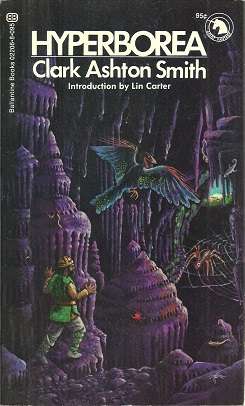 Cover of Hyperborea | |
| Author | Clark Ashton Smith |
|---|---|
| Cover artist | Bill Martin |
| Language | English |
| Series | Ballantine Adult Fantasy series |
| Genre | Fantasy |
| Publisher | Ballantine Books |
Publication date | 1971 |
| Publication place | United States |
| Media type | Print (paperback) |
| Pages | xvi, 203 |
| ISBN | 0-345-02206-8 |
| Preceded by | Zothique |
| Followed by | Xiccarph |
Hyperborea is a collection of fantasy short stories by Clark Ashton Smith, edited by Lin Carter. It was first published in paperback by Ballantine Books as the twenty-ninth volume of its Ballantine Adult Fantasy series in April 1971. It was the second themed collection of Smith's works assembled by Carter for the series. The stories were originally published in various fantasy magazines from the 1930s to the 1950s, notably Weird Tales . [1]